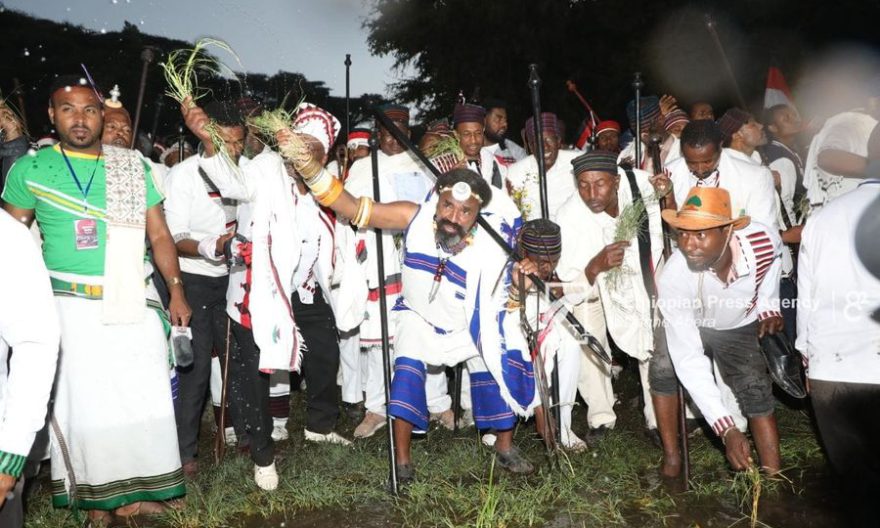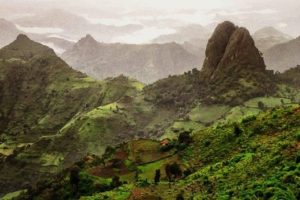
Ethiopians are distinguished by being a conglomerate of diverse communities that have a rich and unique culture in which they celebrate life and their Creator. Ethiopia has numerous and varied holiday seasons. The first five weeks of the Ethiopian calendar can be considered the time of the first holiday season. At no other time in the Ethiopian calendar are there so many different national holidays and cultural celebrations that create an exuberant spiritual ecstasy as at this time of year. This year, Ethiopians celebrate such colorful holidays as the New Year, Mawlid, Meskel and Irreechaa.
Irreechaa is a time for prayer and reflection, but also a time for celebration. It is a unique event celebrated bi-annually [in the fall and spring] in different parts of the country in places with symbolic meaning, such as on hills, lakes, riverbanks, and in the shade of large sacred trees. The main date for the celebration is the second Sunday in October. The locations symbolize the innate connection between the Oromo people and the natural world. The serene ambiance and mystical aura of these venues create an ideal setting for spiritual reflection and communal celebration.
Irreechaa ceremony is undoubtedly the time for one of the largest human gatherings in Ethiopia. The epicenter of the Irreechaa celebration has been at Lake Hora Arsadi in Bishoftu about 40 km south-east of the capital, where the Oromo people from every corner of the country would converge to celebrate thanksgiving day. The capital city, Addis Ababa, itself also is host to this major celebration, which some tourism experts described as a “miss it not” festive event.
The Irreechaa celebrated in spring is an ancient Oromo cultural tradition that celebrates the end of the rainy season and the beginning of the harvest season. The festival serves as a reminder of the collective strength and the unity that exists among the Oromo people. It is a significant occasion in the Oromo culture that brings together all members of the community irrespective of age, sex, and religion. During Irreechaa, the people gather at the sacred places and give thanks to the Creator for the blessings of the past year.
Some scholars explain Irreecha as a thanksgiving, forgiving, and forward-looking expression day for the Oromo. They describe Irreechaa as the oldest form of monotheism. With the magnificent Irreechaa processions, the Oromo extend their praise and appreciation to Waaqaa (the Creator) for providing life necessities to human beings and other living things.
Irreechaa has links with the original way of life of the Ethiopians which is closely linked to agriculture. It is a vibrant celebration of the agricultural cycles that sustain the Oromo community and all Ethiopians in general. As an agrarian society, the Oromo people deeply rely on the land and its bountiful offerings for their sustenance. Irreechaa acts as a spiritual and social event expressing gratitude for the successful harvests and hoping for future abundance and prosperity.
Celebrating the harvest is deeply ingrained in Oromo culture, and Irreechaa embodies this tradition. The Oromo people come together during this festival to express their appreciation for the abundance that nature has provided. Through joyful celebrations and heartfelt prayers, they honor the crops, the fertile soil, and the toil of farmers that sustain their way of life.
Moreover, the Irreechaa celebration also provides an opportunity to address important issues that impact the community. The Oromo elders urge the congregation to engage in dialogue, share ideas, celebrate their shared identity, and collaboratively work towards a better future for all.
During the Irreechaa festival, led by the wise men and the elders, the Oromo perform rituals of thanksgiving, to express gratitude to Waaqa (God) for the bountiful harvest and the blessings bestowed upon them throughout the year. This auspicious event is marked by colorful rituals, and cultural performances, with an overwhelming sense of unity. The unique processions and ritual performances of the Irreechaa festival are attended by an increasing number of foreign tourists.
The Oromo elders lead prayers for peace, prosperity, and togetherness and reflect on the values that bind their community together. They remind the young people in the congregation of the resilience, wisdom, and rich cultural heritage of the Oromo culture. They express their wishes and hope for a peaceful and prosperous future.
The Oromo traditional leaders, Abba Gedas, play a vital role in preserving and perpetuating the traditions of Irreechaa. They carry the responsibility of passing down the knowledge, customs, and sacred rituals associated with this grand celebration from one generation to the next. Their unwavering commitment to safeguarding Irreechaa ensures that the festival remains an integral part of Oromo culture.
Irreechaa ceremonies are replete with symbolic elements that reflect Oromo’s spiritual beliefs and cultural values. Symbolic gestures, such as wearing traditional attire, carrying blessed grasses and flowers, and giving offerings to the spirits, permeate the festivities. These rituals serve as a tangible representation of the Oromo people’s reverence for their ancestors, their connection to the land, and their desire for harmony and prosperity.
During Irreechaa, the Oromo people adorn themselves in vibrant and intricately woven traditional attire. Ornate jewelry, distinguished headdresses, and meticulously designed garments grace the participants, adding to the majesty and uniqueness of the celebration. Each piece of clothing and every ornament holds profound cultural significance, emphasizing the pride the Oromo people take in their heritage. They also exchange gifts and enjoy traditional foods, such as foula, a kind of porridge made from wheat, barley, and maize.
In addition to the traditional rituals and practices, Irreechaa showcases a diverse range of cultural performances. From vibrant dances to melodious songs, and other organized traditional performances that reflect the dynamism and diversity of the Oromo community.
Traditional dance is an integral part of Irreechaa celebrations, with rhythms and movements that reflect the spirit of the Oromo people. The Oromo perform a variety of traditional dances, each with its distinctive style and purpose. The “Warra Qallu,” a dance celebrating Oromo culture and the beauty of community life, and the “Dhaanto,” a lively dance expressing joy and unity, are among the captivating performances that captivate participants and spectators alike.
The Oromo dance movements exude grace, strength, and profound symbolism. The Oromo elders explain the fluidity of their motions conveys unity and harmony, while the energetic leaps and stomps represent the resilience and determination the Oromo people possess. Each gesture and step holds a profound meaning, echoing the rich history and struggles of this remarkable community.
The vibrant sounds of traditional Oromo music fill the air during Irreechaa. Musicians skillfully play a diverse array of musical instruments, each instrument carrying a distinct tone and rhythmic pattern. The “Jaaloo,” a stringed instrument, resonates with nostalgic melodies, while the “Dagaa,” a drum made from hollowed-out tree trunks, infuses the celebrations with captivating beats. The harmonious blend of these instruments amplifies the captivating atmosphere of Irreechaa.
The spirit of gratitude permeates the atmosphere during Irreechaa, reminding the Oromo community of the importance of unity and collaboration. It serves as a moment for reconciliation, a time to put aside differences and come together in celebration.
Irreechaa promotes a sense of collective appreciation, fostering strong bonds within the Oromo society. It is celebrate with the spirit of inclusivity and harmony that defines the Oromo people. The Oromo from all walks of life partake in this event of gratitude and joy to strengthen the bonds that connect them and continue to strive for a bright future filled with peace, prosperity, and unity.
SOLOMON WASSIHUN
The Ethiopian Herald October 8/2023





